
#1 Sleep With A Silk Or Satin Pillowcase
You've heard it before, silk is your hair's best friend. Hair friction while sleeping is one of the most common causes of split ends, and dry and brittle hair.
Silk pillowcases are softer and a lot silkier to touch than cotton pillowcases, which means your hair will encounter less friction overnight and will slide off the pillowcase with ease without causing unnecessary tension and roughness to the hair follicle.
Also, as hypoallergenic and cooling fibers, they won't pull and absorb moisture from your hair and your face when sleeping.
Not to mention that they also maintain better temperature control that helps prevent sweating from your head or neck which can ruin any hairstyle.
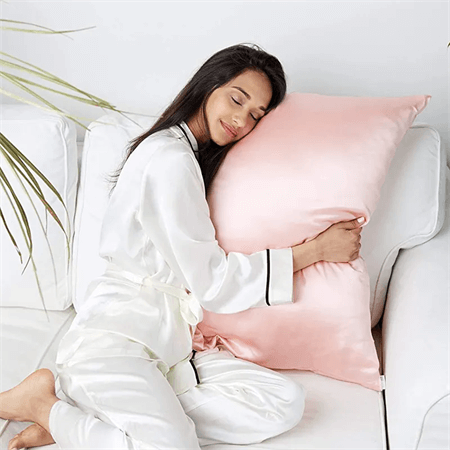
Alternatively, if you tend to toss and turn in bed, silk and satin bonnets are a great option to protect your hair when you sleep, too. Wrap your hair in a silk or satin turban before sleep to avoid the loss of moisture loss and hair breakage.
If you are looking for the best tips on how to sleep with long curly hair, then why not consider investing in a good-quality silk pillowcase that can really improve the quality of your hair, as well as your beauty sleep?
#2 Wear Your Hair Up
Many people may have the same doubts: should I wear my hair up or down? Is it better to sleep with my hair down or up?
Here we will give you the most professional answer. Although sleeping with your hair down may seem the most comfortable, if you don’t secure your hair overnight, you’re likely going to wake up with a sweaty, tangled mess. Thus, the best way to protect long hair while you sleep is to gently wear your hair up.
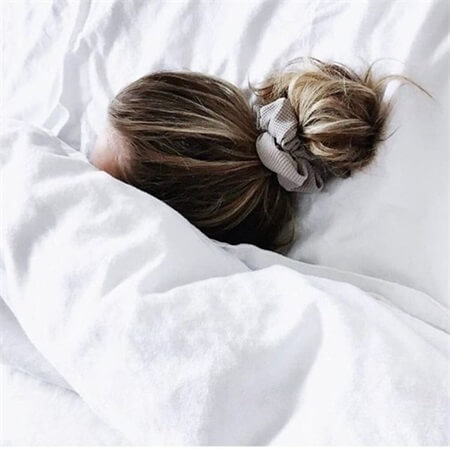
On the one hand, it can protect fine and fragile hair at the nape that is prone to tangling. On the other hand, it can preserve your hairstyle or blowout by preventing kinks from sleeping on and sweating on your hair.
For example, you can try to gather your hair up in a loose bun with french hairpins, which is a demarcation-free method of keeping hair up in place.
Of course, the key is to make the bun high enough on top of your head to not feel it when laying down. At the same time, do not pull your hair so tightly against your head that it puts pressure on the scalp while you sleep.
#3 Never Sleep With Wet Or Damp Hair
As we all know, the keratin bonds in your hair become weak when they are wet, hence making them more susceptible to breakage. Even the soundest sleeper will move their head a bit during the course of a night’s slumber, and that movement is more likely to contribute to hair breakage or matted hair the next morning.
If you plan to wash your hair at night, please be sure you have plenty of time to allow your hair to air dry before you head to bed.
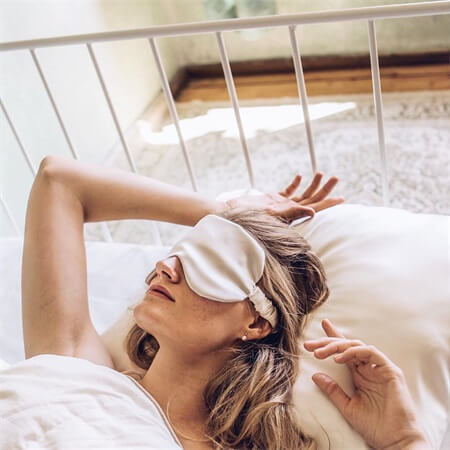
Don’t forget to end your showers with a blast of colder water to help seal moisture into your hair and blow-dry your hair completely right before bed.
If you find yourself in a bind and do need to sleep with wet hair, it would be better to apply some coconut oils to wet hair, thus protecting wet hair from breakage.
#4 Comb Hair Before Going To Bed
If you want to wake up tangle-free, always make sure to brush your long hair gently with a wide-toothed before going to bed, which helps get rid of any tangles and knots in your hair.
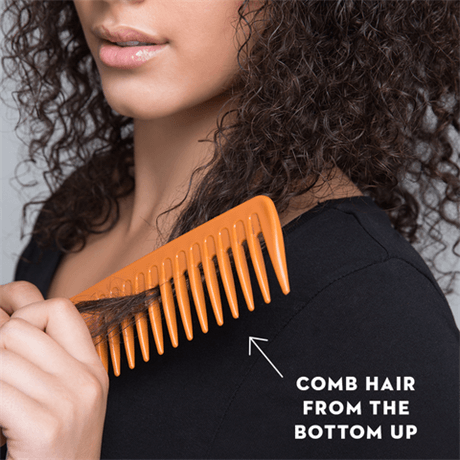
Of course, you can use your fingers or hairbrush to smooth your hair out. But it may lead to breakage or leave your hair with split ends.
Therefore, it is best to use a wide-toothed comb or a detangling brush that is generally softer than regular brushes and can reduce the amount of pressure applied to your scalp and hair. You should find that it glides through your hair without tugging or causing pain.
#5 Secure Hair With Scrunchies
When you’re securing your hair in the evening, elastic hairbands are the typical go-to. But these elastic hairbands can actually put stress on your hair and scalp, and cause friction and breakage. Especially hairbands that have metal clamps or rubber elastic can cause your hair to break and create split ends.
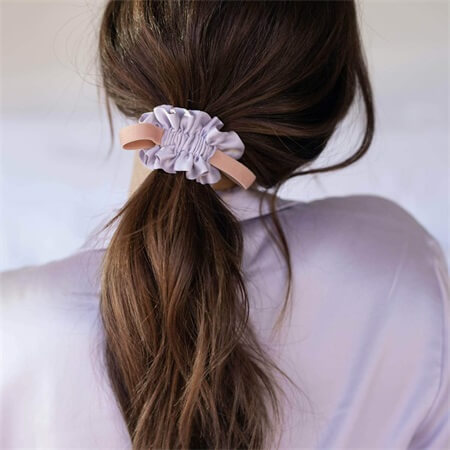
Even sometimes it will result in the hair being pulled from the follicle. To be honest, you might as well be sleeping with a rubber band in your hair.
Instead, tie hair into a top knot using a fabric scrunchie made with silk or satin, which will give your hair a break from the friction and save valuable styling time in the morning. You’ll also be less likely to wake up with a visible “dent” in your hair where you pulled it back.
#6 Deep Condition
Sleep time is a great opportunity to strengthen and repair long locks with an overnight repair mask, leave-in conditioner, or hydrating serum.
Getting into the habit of applying a weekly overnight hair mask will not only improve the condition of your hair but will also help tame frizz, and dryness, and prevent further breakage from happening. After all, a good-quality hair mask will help repair, strengthen, condition, soften, and tame your hair.
You just need to apply a good amount of hair mask to your scalp and hair before you go to bed once a week. You may also place a small towel on top of your pillowcase to avoid any unwanted hair mask stains!
Finally, wash out the mask and style your hair as usual the next morning.
#7 Sleep In A Cool Environment
Any form of heat can zap the moisture out of the air, taking a toll on your hair. It can include the heating unit in your bedroom.
While sleeping in cooler temperatures is not only good for quality sleep but prevents excess sweating that can exacerbate hair tangling.
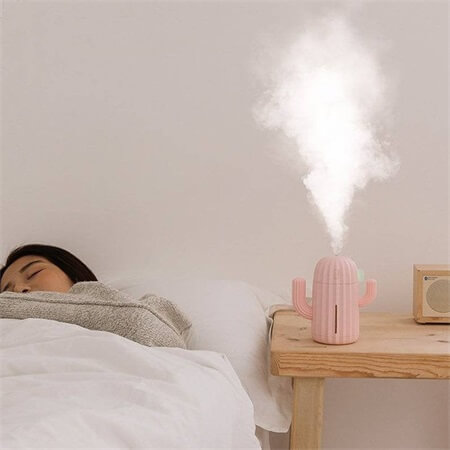
You can keep the air current moving in your room with a fan so that you don’t get sweaty at night and wake up with damp hair.
You may also consider a humidifier to add moisture back into your bedroom’s air or turn the air conditioning up one degree to prevent night sweats. Plus, nothing is better than using a silk hair tie to keep the locks out of your face at night.
#8 Protect Ends With An Essential Oil
Even if you sleep on your back, you might end up crushing longer hair without even knowing it. Naturally, the ends of your hair can bear the brunt of damage that happens while you sleep.

In order to keep your strands hydrated overnight and minimize breakage and split ends, you can apply some essential oils to your ends before you head to bed, such as Argan oil, almond oil, jojoba oil, or even coconut oil.
These essential oils will also penetrate the hair shaft and repair hair from within, leaving your hair feeling soft and more manageable.
Of these above tips, there should be at least one way that works for you! Now start taking good care of your hair to give you a head start on keeping your hair healthy. In the end, happy sleeping!
 8 Disney Princesses Hairstyle Collection-You Don't Miss
8 Disney Princesses Hairstyle Collection-You Don't Miss
 Swoop Ponytail: How do You Tie a Unique Hairstyles?
Swoop Ponytail: How do You Tie a Unique Hairstyles?
 2023 Hottest Trend: Curly Bob Haircuts
2023 Hottest Trend: Curly Bob Haircuts
 U Part VS V Part Wigs, Which One Is Better?
U Part VS V Part Wigs, Which One Is Better?